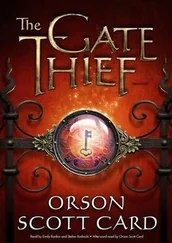Orson Card - THE SHIPS OF EARTH
Здесь есть возможность читать онлайн «Orson Card - THE SHIPS OF EARTH» весь текст электронной книги совершенно бесплатно (целиком полную версию без сокращений). В некоторых случаях можно слушать аудио, скачать через торрент в формате fb2 и присутствует краткое содержание. Жанр: Фантастика и фэнтези, на английском языке. Описание произведения, (предисловие) а так же отзывы посетителей доступны на портале библиотеки ЛибКат.
- Название:THE SHIPS OF EARTH
- Автор:
- Жанр:
- Год:неизвестен
- ISBN:нет данных
- Рейтинг книги:4 / 5. Голосов: 1
-
Избранное:Добавить в избранное
- Отзывы:
-
Ваша оценка:
- 80
- 1
- 2
- 3
- 4
- 5
THE SHIPS OF EARTH: краткое содержание, описание и аннотация
Предлагаем к чтению аннотацию, описание, краткое содержание или предисловие (зависит от того, что написал сам автор книги «THE SHIPS OF EARTH»). Если вы не нашли необходимую информацию о книге — напишите в комментариях, мы постараемся отыскать её.
THE SHIPS OF EARTH — читать онлайн бесплатно полную книгу (весь текст) целиком
Ниже представлен текст книги, разбитый по страницам. Система сохранения места последней прочитанной страницы, позволяет с удобством читать онлайн бесплатно книгу «THE SHIPS OF EARTH», без необходимости каждый раз заново искать на чём Вы остановились. Поставьте закладку, и сможете в любой момент перейти на страницу, на которой закончили чтение.
Интервал:
Закладка:
But the Keeper of Earth was not tied to any plan or schedule of the Oversoul; it sent its dreams through the light-years from Earth itself. It was impossible to guess what the Keeper's purpose was—the dreams it sent seemed to get tangled up in the concerns of the person having the dream, just as happened with Chveya's dream of the rats. Yet there were themes that kept recurring—hadn't Hushidh dreamed of rats also as enemies, attacking her family? This seemed to hint that somehow these large rats were going to be a problem to them on Earth—though there were also the dreams that showed the rats and angels of Earth linked with humans as friends and equals. It was so hard to make sense of all of it—but one thing was certain. The dreams from the Keeper of Earth had not stopped coming, and so perhaps something would happen soon, perhaps the next stage of their journey would begin.
For Nafai was growing impatient. Like all the others, he loved the way they lived at Dostatok, yet he could not forget that this was not the object of their journey. There was an unfinished task ahead of them, a journey through space to the planet where humankind originated, the return of humans for the first time after forty million years, and Nafai longed to go. Life in Dostatok was sweet, but it was also far too closed and neat. Things seemed to have ended here, and Nafai didn't like the feeling that somehow the future had been tied off, that there would be no more changes other than the predictable changes of growing older.
Oversoul, said Nafai silently, now that the Keeper of Earth has awakened again, will you also awaken? Will you also set us on the next stage of our journey?
Nafai was keenly aware of how different were his and Luet's responses to Chveya's dream. He was at once disdainful and envious of Luet's attitude. Disdainful, for she seemed to have let Dostatok become her whole world—what she cared most about was the children, and how this meant that they might also become visionaries, and most specifically how wonderful it was that their Chveya was the first to dream true dreams. How could this matter compared to the news that the Keeper of Earth was stirring again? And yet he envied her for very connectedness with their present life in Dostatok—he could not help but think that she was far happier than he, because her world did center around the children, the family, the community. I live in a larger world, but have little connection with it; she lives in a smaller one, but is able to change it and be changed by it far more than I.
I can't become as she is, nor can she become like me. Individual people have always been more important to her than to me. It's my weakness, that I don't have her awareness of other people's feelings. Perhaps, had I been as observant, as empathic as she, I would not have inadvertently said and done the things that made my older brothers hate me so much, and then our whole path through life might have been different, Elya and I might have been friends all along. Instead, even now when Elemak gives me respect as a hunter and listens to me in council, there is still no closeness between us, and Elemak is wary of me, watching for signs that I seek to displace him. Luet, on the other hand, seems to cause no envy among the other women. As Waterseer, she could just as easily be seen as a rival to Mother's dominance over the women as Elemak is the rival to Father's leadership, and I am the rival to Elemak, but instead there is no sense of competition at all. They are one. Why couldn't Elemak and I have been one, and Elemak and Father?
Perhaps there is something lacking in men, so that we can never join together and make one soul out of many. If so then it is a terrible loss. I look at Luet and see how close she is to the other women, even the ones she doesn't like all that well; I see how close she and the other women are to the children; and then I see how distant I am from the other men, and I feel so lonely.
With those thoughts Nafai finally slept, but only a few hours before dawn, and when he got out of bed he found Luet just as weary from undersleeping, stirring the morning porridge virtually in her sleep. "And there's no school today," Luet said, "so we have all the children and there's no hope of a nap."
"Let them play outside," said Nafai, "except the twins of course, and we can probably leave them with Shuya and then we can sleep."
"Or we could take turns ourselves, instead of imposing on them," said Luet.
"Take turns?" said Nafai. "How dull."
"I want to sleep," said Luet. "Why is it that men are never so tired that they stop thinking about that?"
"Men who stop thinking about that, as you so sweetly call it, are either eunuchs or dead."
"We need to tell your parents about Chveya's dream," said Luet.
"We need to tell everybody."
"I don't think so," said Luet. "It would cause too much jealousy."
"Oh, who but you will care about which child was first to have true dreams?" But he knew as he said it that all the parents would care, and that she was right about needing to avoid jealousy.
She made a face at him. "You are so completely above envy, O noble one, that it makes me envious."
"I'm sorry," he said.
"And besides," she said, "it wouldn't be good for Chveya if a big fuss were made about this. Look what happened to Dza when we made her birthday into a festival—she's really quite a bully with the other children, and it worries Shuya, and that public fuss only made her worse."
"There are times when I see her making the other children run meaningless errands for her that I want to slap her silly," said Nafai.
"But Lady Rasa says –"
"That children must be free to establish their own society, and deal with tyranny in their own way, I know," said Nafai. "But I can't help but wonder if she's right. After all, hers was an educational theory that thrived only in the womb of Basilica. Couldn't we see our own conflicts early on in our journeying as a result of exactly her attitude?"
"No, we couldn't," said Luet. "Particularly because the people who caused the most trouble were the ones who spent the least time being educated by Lady Rasa. Namely Elemak and Mebbekew, who left her school as soon as they came of age to decide for themselves, and Vas and Obring, who were never students of hers."
"Not so, my dear reductionist, since Zdorab is the best of us and he never studied with her, while Kokor and Sevet, her own daughters, are just as bad as the worst of the others."
"You only prove my point, since they went to Dhelembuvex's school and not your mother's at all. Zdorab is an exception to everything anyway."
At that point the twins, Serp and Spel, toddled into the kitchen, and frank adult conversation was over.
By the time they both got free enough to take a nap, the day's activities had wakened them so thoroughly that they didn't want to sleep. So they headed for Volemak's and Rasa's house to confer about the dream.
On the way they passed a group of older boys competing with their slings. They stopped and watched for a while, mostly to see how their own two older boys, Zhatva and Motiga, were doing. The boys saw them watching, of course, and immediately set out to impress their parents—but it wasn't their prowess with the sling and stones that most interested Luet and Nafai, it was how they were with the other boys. Motiga, of course, was an incessant tease—he was keenly aware of being younger than the other boys and his silly pranks and clowning were his strategy for trying to ingratiate his way into the inner circle. Zhatva, however, being older, was there by right, and what worried his parents was how pliant he was—how he seemed to worship Proya, a strutting cock-of-the-walk who didn't deserve so much of Zhatva's respect.
Читать дальшеИнтервал:
Закладка:
Похожие книги на «THE SHIPS OF EARTH»
Представляем Вашему вниманию похожие книги на «THE SHIPS OF EARTH» списком для выбора. Мы отобрали схожую по названию и смыслу литературу в надежде предоставить читателям больше вариантов отыскать новые, интересные, ещё непрочитанные произведения.
Обсуждение, отзывы о книге «THE SHIPS OF EARTH» и просто собственные мнения читателей. Оставьте ваши комментарии, напишите, что Вы думаете о произведении, его смысле или главных героях. Укажите что конкретно понравилось, а что нет, и почему Вы так считаете.









